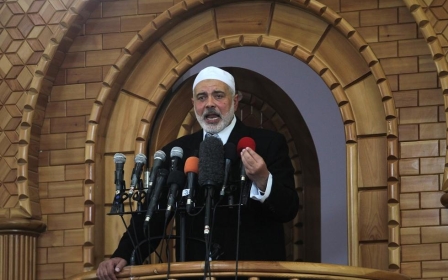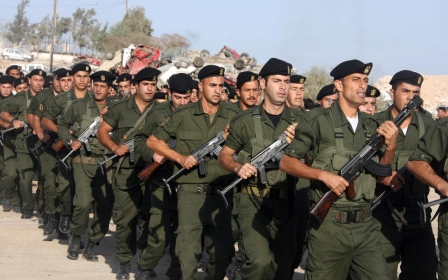PA intensifies its abhorrence of Palestinian resistance

The Palestinian Authority’s penchant for navigating the necessary balance between compromise and political repression has recently manifested in yet another crackdown on Palestinian militants in the West Bank.
Increased resistance against Israel’s settler population provided the PA an excuse to prove its commitment to continuing its security coordination with Israel - the pillar safeguarding the PA’s existence.
During the first week of July, more than 100 Palestinians suspected of militant or activist links with Hamas were targeted by the PA’s security services. According to Hamas, the detained Palestinians included students, community leaders and former political prisoners.
As on previous occasions, including during Operation Protective Edge last summer, the PA has periodically and erroneously insisted that Palestinian resistance factions, in particular Hamas, are responsible for destabilisation. Hamas, however, has defined the PA’s latest manoeuvre clearly.
According to Hamas’s website, the PA’s latest campaign represents “a disgraceful subservience to Israeli dictates in the framework of security coordination between Israel and the PA regime”.
Palestinian lawmaker and Hamas affiliate Mushir al-Masri described the PA’s recurring tactic as “trying to demonstrate to the Zionist enemy that they are still committed to collaboration and security cooperation with Israel against the Palestinian people”.
Capitulation to Israeli demands
Meanwhile, Fatah spokesman Osama Kawasmeh insisted that the arrests constituted “security-related measures”. Use of such euphemisms has become part of official PA rhetoric, however, history has proved otherwise. The targeting of the Palestinian resistance movement is crucial to the PA’s political structure, hence its willing subjugation and capitulation to Israeli demands - in this case a demand to carry out mass arrests following Palestinian resistance against settlers.
In comments reported by the Times of Israel, PA spokesman for security services Adnan Dameri stated: “We will not let Hamas undermine our security and draw our country to bloodshed; we will not let Hamas carry out attacks in the West Bank.”
What both Israel and the PA omit from their narrative is the issue of security coordination and its role in ensuring Israel’s colonisation of Palestine is seen to completion. Hence, the recent arrests should be analysed within the wider framework, in relation to settlement expansion, repression of Palestinian resistance, the PA’s interminable quest of seeking misplaced legitimacy from Israel, as well as the intentional targeting and marginalisation of Hamas from the political process. All four aspects were particularly evident during Operation Brother’s Keeper - the prelude to Operation Protective Edge, during which the PA aided Israel in carrying out violent raids which resulted in mass arrests, including the detention of formerly released Palestinian political prisoners.
While Israeli Prime Minister Benjamin Netanyahu fixated upon altering the aggression narrative to suit Zionist purposes in Gaza, thus focusing upon inconsistent rhetoric and anti-Hamas propaganda, much less attention was given to the dynamics of security coordination and its impact on the Palestinian population.
PA opposition to resistance
Each atrocity, including those carried out in collaboration with the PA, was treated as an isolated incident, allowing both Israel and the PA to carry out substantive collaboration, negotiations and political compromise away from the usual scrutiny. The result was predictable. While the PA consolidated its position as collaborator and internationally recognised alleged Palestinian representative, it also asserted its opposition to Palestinian liberation and resistance - by utilising the fabricated legitimacy garnered from the entities supporting its creation and existence.
Meanwhile, the PA reiterated its approval on torture, massacre and persecution in various forms, including displacement and settlement construction, in a bid to retain the status quo in the aftermath of the destruction of Gaza. Palestinian reality was once again fractured by the PA’s collaboration with Israel. Instead of prioritising Gaza, Abbas and the duplicitous unity government extended Israel’s violence by applying restrictions and slander upon Palestinian resistance factions, notably Hamas.
As the Palestinian Centre for Human Rights (PCHR) has pointed out, both the PA and the unity government should “fully adhere to the law and completely stop arrests on political ground,” adding that the Palestinian High Court of Justice ruling in 1999 established the illegality of such arrests. In its recommendations, the PCHR “calls upon Palestinian security services to fully comply with the constitution and other relevant laws and to respect human rights”.
However, as is the case with Israel and the international community, the PA’s decayed morality structure has created its own impunity system, where Palestinian resistance is criminalised and collaboration applauded. Within the international community, Israel has reaped rewards for its aggressive expansion. Other than mere condemnations diluted by repetitive assertions about Israel’s purported “right to defend itself,” no punitive measures against Israel have been applied - the reason being repercussions upon international complicity.
Upgrading collaboration
In the case of the PA and its security coordination agreements with Israel, the dynamic is even more treacherous. Israeli violence has resulted in severe human rights violations since the establishment of the state on Palestinian land. However, the PA’s willing subjugation to Israel and the international community, notably the US, has created another hegemonic entity within the political structure whose main objective is to facilitate the seizure of territory by Israel at the expense of the indigenous population.
Not content with its role in manipulating Palestinian narrative, the PA is gradually upgrading its status as collaborator and unleashing different forms of oblivion targeting the Palestinian population. Meanwhile, Hamas has recently endeavoured to put forth a coherent narrative that seeks to implement resistance as a Palestinian right, rather than a detail within the international law framework that can be misinterpreted and applied according to foreign interests in the region.
As is evident from recent statements, Hamas seems to be gradually abandoning the diplomatic tone that resulted in contradictory statements by officials and restrictions with regard to the two-state compromise. It is now necessary for Hamas to implement the same assertions uttered with regard to security coordination, to other forms of aggression implemented by Israel and the PA. Such a move would combat the enforced marginalisation of the movement, as well as create the imperative shift from diplomatic restriction to identification with the original aim of Hamas – the liberation of historic Palestine.
- Ramona Wadi is an independent researcher, freelance journalist, book reviewer and blogger specialising in the struggle for memory in Chile and Palestine.
The views expressed in this article belong to the author and do not necessarily reflect the editorial policy of Middle East Eye.
Photo: Palestinian children stand next to a member of the al-Qassam Brigades, the armed wing of the Hamas movement, during an anti-Israel parade on July 13, 2015 in Rafah, in the southern Gaza Strip, on the first anniversary of the 50-day war between Israel and Hamas' militants in the summer of 2014. (AFP)
Middle East Eye propose une couverture et une analyse indépendantes et incomparables du Moyen-Orient, de l’Afrique du Nord et d’autres régions du monde. Pour en savoir plus sur la reprise de ce contenu et les frais qui s’appliquent, veuillez remplir ce formulaire [en anglais]. Pour en savoir plus sur MEE, cliquez ici [en anglais].




